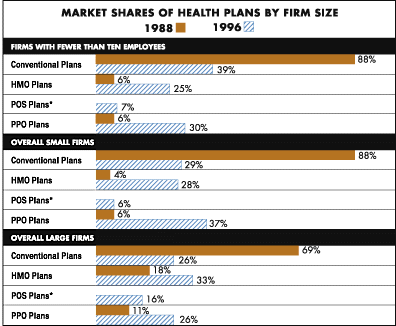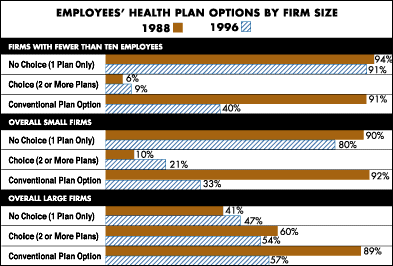
Trends in Managed Care Coverage in Small Firms
Data Bulletin No. 09
Winter 1998

Sources: Health Insurance Association of America, 1988; KPMG Peat Marwick, 1993 and 1996.
Note: Some columns may not add up to 100 percent because of rounding.
*Health Insurance Association of America did not ask about POS plans in 1988.
![]() mall employers were slow to adopt managed care, but now managed care dominates the small-employer market almost to the same degree as it does the large-employer market. A recent analysis of market shares of health plans offered by employers shows that 71 percent of small firms and 75 percent of large firms have some form of managed care plan. Managed care is defined here as health maintenance organizations (HMOs), point-of-sale (POS) plans and preferred provider organizations (PPOs). This increase represents tremendous growth in the small-employer market: in 1988, managed care accounted for only 12 percent of the market.
mall employers were slow to adopt managed care, but now managed care dominates the small-employer market almost to the same degree as it does the large-employer market. A recent analysis of market shares of health plans offered by employers shows that 71 percent of small firms and 75 percent of large firms have some form of managed care plan. Managed care is defined here as health maintenance organizations (HMOs), point-of-sale (POS) plans and preferred provider organizations (PPOs). This increase represents tremendous growth in the small-employer market: in 1988, managed care accounted for only 12 percent of the market.
Much of the rapid increase in the market share for managed care plans in small firms stems from the action of employers because in many cases employees no longer have the option to enroll in conventional plans.
OPTIONS LIMITED IN SMALL FIRMS
![]() ven though their options have increased since 1988, employees in small firms have significantly less choice of health plans than do employees in large firms. (See chart below.) In 1988, 10 percent of employees in small firms had a choice of two or more plans; by 1996, this had increased to 21 percent. In contrast, 60 percent of employees in large firms in 1988 had a choice of two or more plans and, although only 54 percent of employees in large firms had this choice in 1996, these workers still have far more opportunity to select from a variety of health plans than do employees in small firms.
ven though their options have increased since 1988, employees in small firms have significantly less choice of health plans than do employees in large firms. (See chart below.) In 1988, 10 percent of employees in small firms had a choice of two or more plans; by 1996, this had increased to 21 percent. In contrast, 60 percent of employees in large firms in 1988 had a choice of two or more plans and, although only 54 percent of employees in large firms had this choice in 1996, these workers still have far more opportunity to select from a variety of health plans than do employees in small firms.
The proportion of employees in small firms who have access to a conventional plan declined to a much greater extent than among employees in large firms. In 1988, 92 percent of employees in small firms had access to a conventional plan; in 1996, only 33 percent had such access. In large firms, 89 percent of employees in 1988 had access to a conventional plan, and 57 percent still had such access in 1996.

Sources: Health Insurance Association of America, 1988; KPMG Peat Marwick, 1996.
Note: Some columns may not add up to 100 percent because of rounding.
OUT-OF-POCKET COSTS HIGHER IN SMALL FIRMS
![]() mployees in small firms pay a much larger share of premiums than do employees in large firms; much of this difference developed in recent years. In 1988, employees in small and large firms paid 12 percent and 13 percent, respectively, of the premium for single coverage and 34 percent and 29 percent, respectively, of the premium for family coverage. By 1996, employees paid 33 percent and 22 percent, respectively, for single coverage in small and large firms and 44 percent and 30 percent, respectively, for family coverage.
mployees in small firms pay a much larger share of premiums than do employees in large firms; much of this difference developed in recent years. In 1988, employees in small and large firms paid 12 percent and 13 percent, respectively, of the premium for single coverage and 34 percent and 29 percent, respectively, of the premium for family coverage. By 1996, employees paid 33 percent and 22 percent, respectively, for single coverage in small and large firms and 44 percent and 30 percent, respectively, for family coverage.
In terms of actual costs to employees, the average monthly employee contribution for single coverage in small firms increased 21 percent a year-from $12 in 1988 to $56 in 1996, and the average monthly contribution for family coverage rose 23 percent a year-from $34 to $175. At the same time, total premiums increased only 8 percent annually.
A PERSPECTIVE ON TRENDS
![]() mall firms moved very rapidly in the switch to managed care, perhaps because they started later than large firms. The rapidity of this transition and the dynamics of the change may help explain some of the current backlash against managed care. In 1988, virtually all employees in small and large firms had access to a conventional plan, but in 1996, that access was dramatically reduced, especially in small firms. The implication is that most people in 1988 enrolled in a managed care plan because they preferred it to a conventional plan. But eight years later, with far fewer people having that choice, there presumably are significant numbers of people for whom the managed care plan was not their first choice. Such persons are likely to be much less accepting of some of the restrictions involved in managed care.
mall firms moved very rapidly in the switch to managed care, perhaps because they started later than large firms. The rapidity of this transition and the dynamics of the change may help explain some of the current backlash against managed care. In 1988, virtually all employees in small and large firms had access to a conventional plan, but in 1996, that access was dramatically reduced, especially in small firms. The implication is that most people in 1988 enrolled in a managed care plan because they preferred it to a conventional plan. But eight years later, with far fewer people having that choice, there presumably are significant numbers of people for whom the managed care plan was not their first choice. Such persons are likely to be much less accepting of some of the restrictions involved in managed care.
This Data Bulletin is based on data from KPMG Peat Marwick’s national survey of all employers of all sizes, Health Benefits in 1993 and Health Benefits in 1996, and from the Health Insurance Association of America in 1988. The KPMG and HIAA surveys used a similar questionnaire, sample design and set of statistical weights. Survey interviews were conducted by telephone.
This Data Bulletin is adapted from "Small Employers and Their Health Benefits, 1988-1996: An Awkward Adolescence," by Jon R. Gabel, Paul B. Ginsburg and Kelly A. Hunt, which appeared in the September/October 1997 issue of Health Affairs.